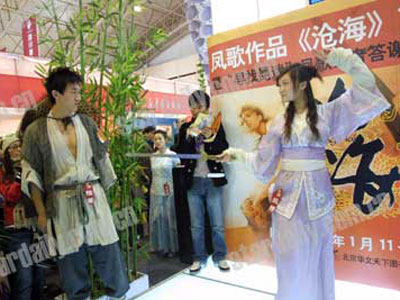
In contrast to the popularity of history and classic books, fiction in 2005, especially by well-known Chinese writers Mo Yan, Su Tong and Yu Hua, generally flopped among readers and became a target for critics.
The three prestigious writers all had one of their signature works adapted into award-winning films by Zhang Yimou.
Last year, Mo Yan churned out his latest offering Birth, Death and Fatigue, a 490,000-word novel, within 40 days.
The story follows the fates of typical Chinese farmers and attempts to assume a grand structure, filled with vivid narrative and a torrential flow of sharp, rich words. Its style was influenced by William Faulkner and Gabriel Garcia Marquez.
However, the book was criticized by Feng Yu, a Beijing-based critic, for being "too heavy with form and skills and did not pay enough attention to convincing details, perhaps due to his deteriorated sensitivity about the conditions of contemporary rural life".
The book failed to make a big splash in the book market.
Su Tong's Binu, a new version of the age-old folk tale of Meng Jiangnu, wife of a laborer who died from over working during the construction of the Great Wall, also flopped.
What attracted more public attention was the verbal warfare between Yu Hua and critics of his new novel, Brother II.
Since hitting the bookshelves last March, it has sold about 600,000 copies 200,000 more than Brother I in 2005, according to the Shanghai Literature and Art Publishing House.
However, despite its commercial success, many critics said the book abounded in defects in detail and lacked greatly expected inner strength.
Yu hit back, claiming the book was "so far the most satisfying work I have created".
In June, a collection of essays by 21 barbed-tongued critics of Yu's latest work was published by the Beijing Tongxin Press.
One of the essays called the book "a big clump of junk". "The realism approach embraced by many of today's Chinese fiction writers is too simple, and the combination of the form and content are far from perfect," Zhang Yiwu, a literary critic, told local media.
By contrast, novels by obscure writers have gained growing popularity. One example is Red Coal, written by Liu Qingbang, a former coalminer and journalist covering news about Chinese coal mining industry.
The book gives a vivid and realistic portrayal of the changes in the life of Chinese coal miners working in privately owned, smaller-scale coalmines.
(China Daily January 16, 2007)
| 